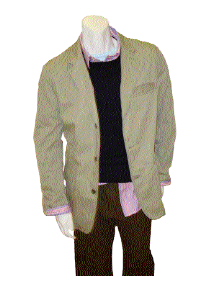People like to say “clothes make the man,” but nobody honestly believes this is true. I mean, why would they? Fabric is merely fabric; wool is simply wool. I think a better (but perhaps less practical) cliché would be, “clothes make the mannequin.”
Last week I needed a sweater, which is always a problem. I don’t understand how to buy things; I always choke in the clutch. But in this instance I made (what seemed like) a brilliant decision: I walked into the Gap on 42nd and 3rd and immediately purchased every garment the most eye-catching mannequin happened to be wearing. I actively became the human incarnation of an inhuman model, primarily because (a) I assume that the kind of people who dress mannequins spend a lot of time considering aesthetics, (b) this eliminated decision-making, and (c) I am somewhat mannequin-shaped. What I bought, I suppose, is an outfit, which is something I’d never done before.
Now, this outfit basically has three pieces: (1) a blue sweater that looks like something I would wear if became an assistant coach for the North Carolina Tar Heels, (2) a collared dress shirt that you’re supposed to untuck on purpose, and (3) new jeans that are designed to resemble semi-old jeans.
I wore these items the very next day; the moment I looked into the bathroom mirror, I could tell it would be a controversial move. I looked totally fucking different in every fucking context. “Who is this person?” I thought to myself. “I’ve never seen this person before.” It suddenly dawned on me that I could disappear into the Witness Protection Program simply by combining a blue sweater with an untucked dress shirt.
I start walking to work, and I can tell that everything about my life is instantly weirder. I feel like a mannequin. And this feeling is fascinating, because I have no idea how a mannequin is supposed to feel; without even trying, I’m instantaneously projecting my fictionalized assumption about how it feels to be an inanimate object onto myself.
As I take the elevator up to the magazine that I am employed with, I anticipate that everyone in the office will have an immediate reaction to my sweater-fueled redesign. I am absolutely correct. “This is a stunning development,” says a fact-checker. “Are you in love?” asks a woman I barely know. “I am going to make my boyfriend buy that dress shirt,” claims an editorial assistant. On the whole, it seems my “mannequin appropriation project” is testing especially well with female audiences.
Men around the office are supportive, but somehow more skeptical. “What happened to you?” asks a man I often eat lunch with. “Are you supposed to be an indie rocker now?” I cannot overstate the cultural impact of untucking one’s dress shirt while wearing a sweater; if you haven’t tried this, you totally should. “This is probably a good direction for you,” my lunch companion continues, “but this overt untucking is going to erode your outsider appeal. Plus, now you’ll have to listen to Superchunk all afternoon.”
“But this isn’t a statement about social class or personal iconography,” I say in response. “Don’t you get it? I’m a mannequin now. I bought these clothes off a mannequin, so I’ve become that mannequin. It’s like I’ve turned into a new person by turning into a nonperson, which is, like… oh, I don’t know—maybe this offers some kind of interesting insight on consumerism and vanity and what dictates who we really are.”
“Oh, really,” said my friend flatly. And in an alternative reality, this is where he would have said, “Well, clothes make the mannequin.” But that’s not what he said, because—in this reality—that is not a cliché that people say.
So we just went to lunch, and I spilled gravy on my Carolina sweater, because I am alive.





